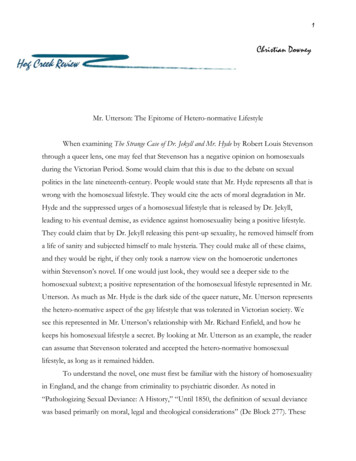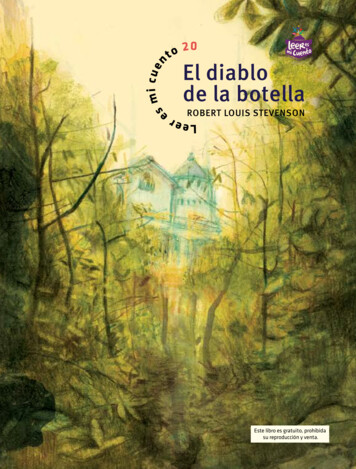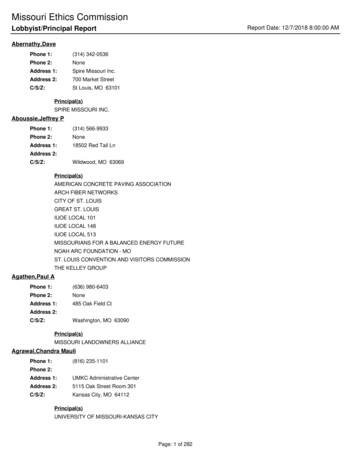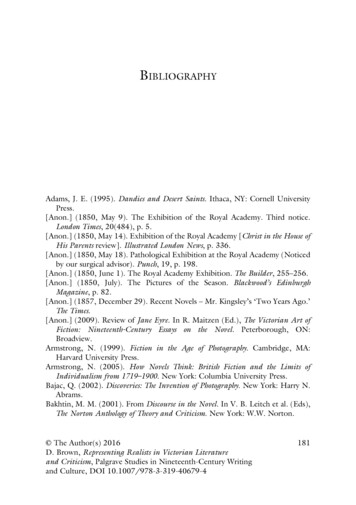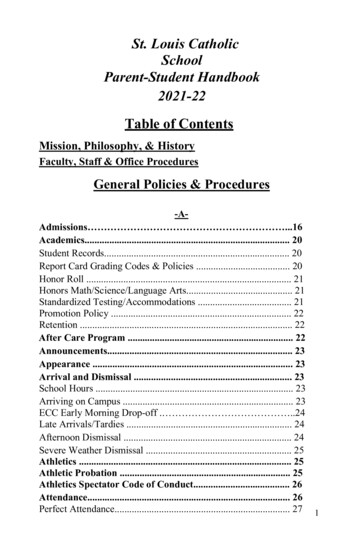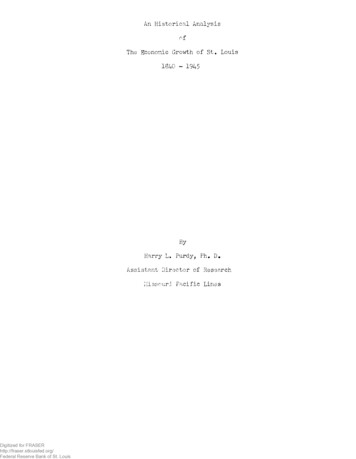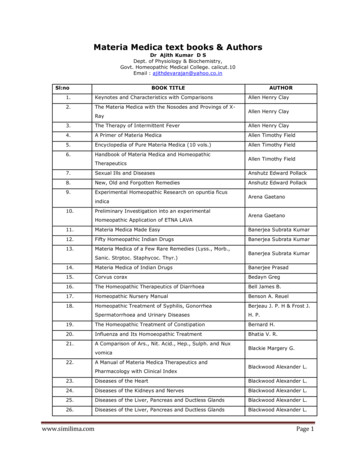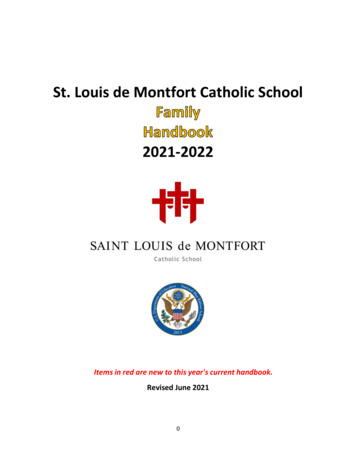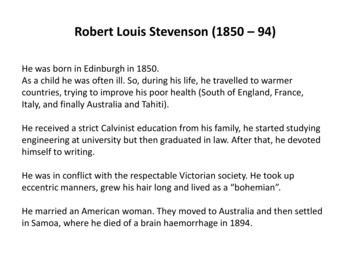
Transcription
Robert Louis Stevenson (1850 – 94)He was born in Edinburgh in 1850.As a child he was often ill. So, during his life, he travelled to warmercountries, trying to improve his poor health (South of England, France,Italy, and finally Australia and Tahiti).He received a strict Calvinist education from his family, he started studyingengineering at university but then graduated in law. After that, he devotedhimself to writing.He was in conflict with the respectable Victorian society. He took upeccentric manners, grew his hair long and lived as a “bohemian”.He married an American woman. They moved to Australia and then settledin Samoa, where he died of a brain haemorrhage in 1894.
His most well known novels are:Treasure Island (1883)The Strange Case of Dr Jekyll and Mr Hyde (1886).Ha also wrote a lot of short stories.Dr Jekyll and Mr Hyde is a psychological novel where the main theme is thetheme of the double, strongly related to the moral dichotomy betweengood and evil present in Victorian society.The “double protagonist” embodies the hypocrisy of the Victoriancompromise: Dr Jekyll is a respectable gentleman, but he hides insidehimself an evil part (Mr Hyde) which at the end will prevail. So the novel isalso a critique to the strict Victorian morality and hypocrisy.
The plotDr Jekyll is a scientist who, in order to improve mankind, wants to create apotion that can separate the double nature of man’s soul.It’s the same drug that releases Hyde and restores Jekyll.With time, he becomes addicted to it and his evil part, Hyde, becomesstronger and stronger, so the man becomes a criminal and he will commitseveral crimes.His evil double Hyde will end up dominating and controlling Jekyll. So the manhas only two choices: he can either choose a life of crime and depravity oreliminate Hyde by killing himself.Stevenson implies that if man wants to live in a civilized society, he has torepress the most instinctive part of himself.An important character in the story is Mr. Utterson, Jekyll’s best friend, who isalso a lawyer, and will investigate into this story. He understands thatthere is a strong connection between Jekyll and Hyde from several clues,but he will only find out the truth after Jekyll’s death, by reading twoletters left by him.
Literary genreThis novel doesn’t belong to a clear literary genre, but showselements of different traditions.The Gothic novel: the most important events happen at night, in adark, gloomy atmosphere. There’s a typical labyrinthine setting: theLondon described by Stevenson is like a labyrinth and dr Jekyll’shouse is isolated. Mystery, horror and terror are other importantelements.The Detective story: mr Utterson is like a detective who collectsevidence and makes hypotheses. At the end of the story, by puttingtogether the various clues , he finds a rational explanation. Othertypical elements of the crime story are: the title (“case”), thesetting (a foggy, badly-lit London), and the plot (some mysteriousevents are solved by rational enquiry).Decadentism: some typical elements are: the solitary protagonist, hisstrange and perverse interests, his tendency to a minute selfanalysis which leads him to an inability to act (like Hamlet!), theinexpressed moral position of the author (although the story dealswith moral issues).
The theme of the doubleThe double, or doppelgänger, is a second self, who is a distinct and separatebeing, but who is also dependent on the original.There are a lot of details in the novel related to the theme of the double, forexample:When Jekyll turns into Hyde he undergoes also physical changes: Jekyll is talland slim, while Hyde is small, deformed and ugly.Jekyll’s house has two entrances: the front door (clean, respectable) and theback door (small and dirty, where Hyde goes out from).The novel is set in London but it’s full of references to Stevenson’s hometown:Edinburgh. Edinburgh is a “double town”, divided into an old, medievaltown full of narrow streets and dark passages, and a new town, with largestreets and respectable big, white buildings.
MeaningThe author doesn’t clearly express any moral message, but deals withdifferent issues. The individual and “forbidden knowledge”: like dr Faustus andFrankenstein, also Jekyll wants to go beyond human limits but is inevitablypunished in the end. The dramatic conflict of human nature: man is divided in two parts (agood one and an evil one, a higher and a lower, one spiritual, the otherphysical). These contrasts can lead to sin, which is often dangerous. A study on human personality and psychology: the story shows thatrepression of a part of man’s personality (the instinctive part) onlyincreases its force and leads to the destruction of the personality. Theauthor doesn’t offer a moral solution (Jekyll suffers both when herepresses his instincts and when he liberates them), but shows a newawareness of the human mind: the human mind is not a single, welldefined block, but is made up of multiple, often contrasting pieces. Thisvision anticipates the age of psychoanalysis. A satire on contemporary morality: Dr Jekyll reflects the duplicitousatmosphere of Victorian society.
Narrative structure and styleThe novel has a complex narrative structure, due to the shift of the narrativepoint of view. There are three different narrators: a third person narratorwho tells most of the story but who is not omniscient, and two firstperson narrators: dr Lanyon, who writes down his version of the story, andfinally dr Jekyll himself, whose final confession takes up the last chapter ofthe book.The style is characterized by a mixture of realism and symbolism. Stevensonis very precise in his descriptions. But the detailed physical descriptions ofJekyll turning into Hyde also have a deep symbolical meaning. (Dr Jekyll istall, erect and virtous, while mr Hyde is short, crooked and malignant. Butat the end Hyde gradually becomes stronger, also in a physical sense. Hydeis taking control over Jekyll or, on a moral level, evil is triumphing overgood.)
The Strange Case of Dr Jekyll and Mr Hyde (1886). Ha also wrote a lot of short stories. Dr Jekyll and Mr Hyde is a psychological novel where the main theme is the theme of the double, strongly related to the moral dichotomy between good and evil present in Victorian society. The "double protagonist" embodies the hypocrisy of the Victorian
